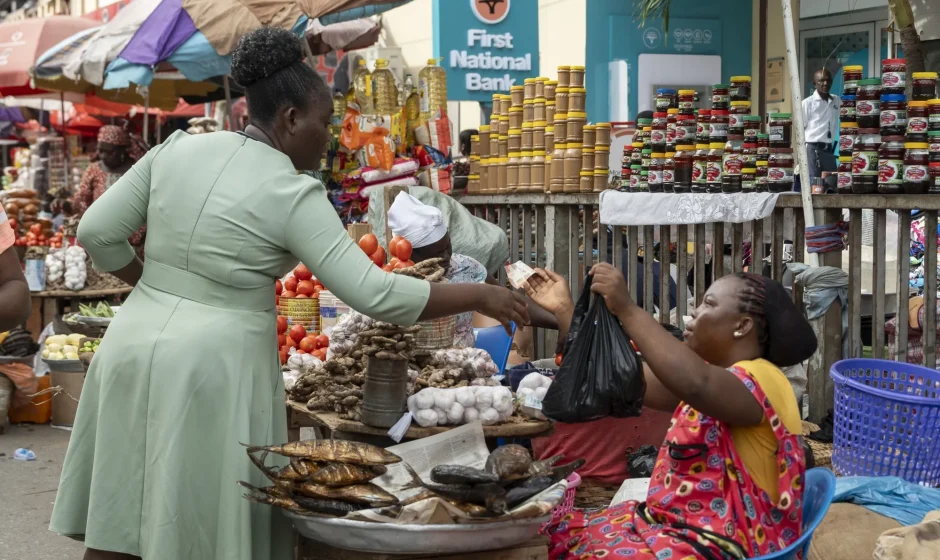Ghana’s economy is growing and diversifying. Its GDP is around $80–85 billion (2024) and expanded about 5–6% last year. Services make up nearly half of output (about 49% of GDP) with industry ~32% and agriculture ~19%. The country rebounded from a debt crisis and high inflation with IMF support, and recent data show robust growth in mining, construction, ICT and financial services. Ghana is a major exporter of natural resources: it is Africa’s largest gold producer (about $7.6B in gold exports in 2023) and the world’s second-largest cocoa producer. It also earns significant revenue from crude oil, bauxite, manganese and other commodities. In short, Ghana has a young population (70% under 35) and untapped resources, poised to leverage its new AfCFTA status as an ECOWAS trade hub.
Image: The Republic Bank building in Accra’s business district – Ghana’s growing financial hub. Ghana’s GDP is rebounding (WB projection ~5% growth by 2026) and its economy is dominated by services and industry.
Despite this promise, infrastructure gaps remain. Much of Ghana’s road network (over 60% of feeder roads) is in poor condition, limiting rural commerce. Electricity access is fairly high overall (about 87% of households) but only ~50% in rural areas, and supply can be costly and unreliable due to debt and technical losses in the power sector. Internet and mobile access are growing, but an estimated 30% of people (mostly in remote rural regions) are still unconnected. Water, sanitation and urban transportation infrastructure also lag behind demand. In short, Ghana needs investments to modernize energy, roads, digital networks and water/waste systems. The business environment faces high utility costs, intermittent power and cumbersome permits. These gaps highlight opportunities: entrepreneurs who bring technology, renewable energy solutions, logistics or construction can both profit and uplift communities by improving critical infrastructure.
Ghana offers many profitable, high-impact business opportunities for diasporans. Key sectors include agriculture and agro-processing (e.g. cocoa processing, palm oil, cashews, cassava, horticulture). Only about half of Ghana’s arable land is farmed, so modern farming or irrigation businesses can thrive. Small rural ventures like poultry farms, fish hatcheries, beekeeping or cold-storage can employ local farmers and reduce post-harvest loss. Renewable energy is another rural-friendly field: companies installing solar home systems or mini-grids can expand electricity access and train local technicians. Likewise, water management (boreholes, filtration) and waste recycling enterprises can improve health and jobs in villages.
- Agribusiness & Agri-tech: Invest in farming, agro-processing or farm-supply businesses. For example, a cashew farm or rice mill in the north can create dozens of local jobs and boost exports. Building a small cocoa processing factory adds value locally and employs factory workers. Partner with cooperatives to share profits and skills.
- Renewable Energy & Utilities: Launch solar or biogas companies. A solar panel assembly plant or mini-grid project can provide power to off-grid towns, training local electricians and reducing poverty. Ghana’s power sector needs private investment to improve reliability. Battery storage or efficient cookstoves are also in demand, creating technical and manufacturing jobs.
- Technology & Digital Services: Ghana’s youthful, tech-savvy workforce and growing digital economy (outsourcing, fintech, e-commerce) are fertile ground. Entrepreneurs can open tech hubs, coding schools or mobile-app startups. For example, a fintech startup for mobile payments or lending can partner with local banks and hire Ghanaian developers. An e-commerce platform for Ghanaian goods (artisanal crafts, clothing, cosmetics) can tap global markets. Training centers for IT skills empower young Ghanaians and supply talent to these companies.
- Tourism & Hospitality: Ghana’s “Year of Return” (2019) and ongoing cultural events (e.g. “Beyond the Return” festivals) draw many diaspora visitors. Building lodges, tour agencies or cultural experience companies in cities like Accra, Cape Coast or Kumasi can be lucrative and community-focused. For instance, a boutique hotel using local designs, or village homestay programs, can employ guides, cooks and artisans. Restaurants serving Ghanaian-African cuisine (even in diaspora flavors) are in demand in Accra and tourist areas. Ecotourism ventures (wildlife parks, mountain trekking in Volta) also create rural jobs and preserve heritage.
- Education & Healthcare: Private schools, vocational training centers, clinics and telemedicine are high-impact sectors. A childcare or trade school (e.g. in ICT, carpentry, tailoring) can train and employ local teachers. Clinics or medical labs serving suburbs and towns not only earn fees but improve health outcomes. Partnering with NGOs or hospitals to upskill staff creates goodwill. Healthcare startups (online pharmacy delivery, diagnostic kits) address service gaps and hire local pharmacists and technicians.
- Light Manufacturing & Construction: Starting small factories (textiles, furniture, plastic goods) or building affordable housing meets domestic demand and substitutes imports. Ghana encourages local manufacturing: factories for processed foods (e.g. packaged cassava, spices) or building materials (blocks, steel roof sheets) are needed. Such plants hire line workers and engineers. Construction firms can build roads, hospitals or solar farms, providing jobs to masons, drivers and engineers.
- Financial & Business Services: As Ghana’s economy grows, demand rises for accounting, consulting, logistics and security services. A branch of a U.S. accounting firm, for example, can train Ghanaian accountants. Mobile lending and microfinance companies can improve financial inclusion. Even creative services (film, music production, advertising) are expanding and can partner with local artists. These white-collar businesses often start small but scale quickly, training staff in international standards.
Each business idea above can be both profitable and impactful by hiring local workers, paying fair wages, and transferring skills. For example, an agritech company can provide seeds and training to farmers (uplifting communities), or a tech startup can run coding bootcamps for youth. Partnering with Ghanaian entrepreneurs or offering employee equity stakes ensures local buy-in.
Image: Ghana’s Tema port and container terminal – reflecting its strategic role in trade and the AfCFTA (African Continental Free Trade Area). Ghana’s position as a logistics and manufacturing hub of West Africa is an opportunity for exporters and importers.
Visa and Legal Pathways for Diaspora Entrepreneurs
Ghana is very welcoming to the African diaspora. The Persons of African Descent (PAD) Act grants eligible African Americans the Right of Abode, i.e. indefinite residence in Ghana. This means after applying, you can live in Ghana permanently without immigration quotas. Ghana also allows dual citizenship, so you can eventually become a Ghanaian citizen while retaining U.S. citizenship. In fact, in late 2024 Ghana granted citizenship to 524 members of the Black diaspora (mostly Black Americans), the largest such group since the 2019 “Year of Return”.
For entry visas, Ghana requires U.S. citizens to obtain a visa, but there are investor-friendly policies. Short-term single-entry visas (up to 3 months) or multiple-entry business visas can be arranged through Ghanaian consulates. The government often runs visa-on-arrival or visa-waiver campaigns (for example, during the “December in GH” festival) to ease travel. Some organizations even offer a streamlined VOA service for diaspora entrepreneurs. Once in Ghana, to operate a business you register with the Registrar General’s Department and may need to apply to the Ghana Investment Promotion Centre (GIPC). Note that the popularly cited $50,000 capital requirement only applies to trading (import/export) firms; it is not a universal business-starting rule. Many sectors (services, manufacturing, agriculture) have lower or no minimum. Foreigners can also partner with Ghanaians to ease requirements.
Overall, Ghana’s laws favor foreign investment: there are incentives and tax breaks for developers and exporters. Entrepreneurs can apply for work or residence permits linked to their business. The new Right of Abode law makes it especially convenient for Black American entrepreneurs to relocate and invest, knowing they can stay long-term and even secure citizenship. With Ghana’s pro-business reforms and focus on attracting diaspora capital, U.S.-based Blacks have clear legal paths to starting impactful ventures in Ghana.
Sources (for reference):
- Ghana Statistical Service – Quarterly GDP (Q4 2024).
- FocusEconomics – Ghana Economic Data & Projections.
- World Bank – Ghana Country Overview (Mar 2025).
- U.S. International Trade Administration – Ghana Digital Economy and Energy guides.
- Copenhagen Consensus – Ghana Rural Transport Report (infrastructure gaps).
- Broadband Commission – Connectivity in Ghana (2022).
- U.S. Department of State – Ghana Investment Climate Statement (2023).
- CNBC Africa – “Ghana to Regain Momentum in 2025 as ECOWAS Gateway” (July 2024).
- AP News – “Ghana grants citizenship to people from African diaspora” (Dec 2024).
- Ghana Ministry of the Interior – Right of Abode (Persons of African Descent) information.



